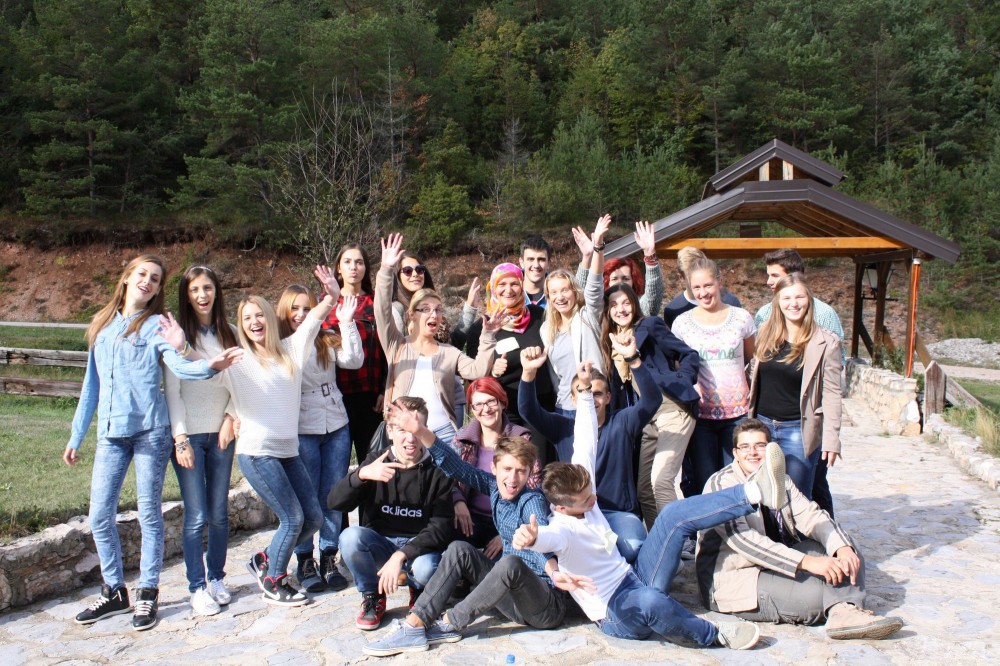One of the activities originating from last year’s Training for Trainers (TfT) of the Centre for Nonviolent Action Sarajevo/Belgrade, two one-day workshops under the title “Images Mine and Yours/ Stereotypes and Prejudice” were held for upper classes of secondary school pupils in BiH from towns where there were national divisions. The idea for these workshops came from the participants of the TfT who came up with them and organised them with the support of the CNA team.
The first workshop was held at the ethno village Bijele vode near Goražde on 1 October 2015 and it was attended by secondary school pupils from Foča and Goražde, while the second was held on 3 October in Milići and included young people from Milići, Bratunac and Srebrenica. The workshops were organised by a team of peace activists from Skopje, Mostar, Bijeljina and Belgrade with the support of the Centre for Nonviolent Action Sarajevo/Belgrade and the Open Heart House from Mostar. Given that various stereotypes and prejudices (especially ethnic) are the basis for excluding ‘others’ in our environments, this seemed like the logical place to start. Particularly because of our common impression that there was a lack of peace education intended for young people in this very crucial period of growing-up when personalities are formed. This is all the more important because young people in BiH today mostly live in environments where dominant ethnic narratives are rarely questioned, without many opportunities to truly discuss different perspectives with those ‘from the other side’.
Although both one-day workshops were designed to be almost identical (with minor modifications of some exercises after the first one was held), the outcomes were different. The first workshop with nineteen young people from Foča and Goražde was bursting with energy and dynamics. To a large extent, the participants themselves, with their openness and readiness to breach (even painful) topics, dictated the tempo. Their readiness to openly discuss issues was also accompanied by a sensitivity and care not to hurt or offend others. The ethnic diversity of the pupils and discussions of mutual stereotypes and prejudices in their respective environments and the way these shape and restrict their lives facilitated bringing awareness to social mechanisms that are actually very similar (although with different ethnic prefixes) and connecting the personal to the social. This can also be connected to the fact that a large part of the pupils were active in their local communities in different ways. Compared to this first workshop, the group made up of young people from Srebrenica, Bratunac and Milići was more closed and hesitant to touch upon painful topics. Some of the factors that may have contributed to this were that, as opposed to the first group, this group was entirely mono-ethnic, and a significant number of participants (eight of the twenty that were planned to attend) did not show up for the workshop. Despite this, the impressions of the participants at both workshops coincide. Both groups pointed out as particularly significant just the very opportunity to discuss all these topics, because talking about them is usually not encouraged in their environments.
The preparation and implementation of these workshops was also significant for us from the training team. Although we assessed that the initial objective of the workshop to empower young people to actively work on building trust in their environments was not achieved, that instead we remained on the basic level of recognising stereotypes and prejudices, we believe that the very opening of these topics is a step in the right direction. Even though the workshops themselves were inspiring and motivating for us, frustration with the teamwork process in preparing the workshops, insufficient communication of mutual expectations, ad hoc division of tasks and roles within the team and a preoccupation with the internal dynamics of the team resulted in a feeling of exhaustion and logistical and content-related shortcomings in the preparation of the workshops. These were the reasons for cancelling the workshops planned for Mostar and Travnik/Novi Travnik on 15 and 17 October. Mostly because almost nothing was done in terms of logistical preparation for the workshops. The importance of a detailed and clear division of roles, obligations and expectations was one of the important lessons learned from the whole process.
On the other hand, the workshops confirmed our supposition that it was extremely important to work with young people at this age who live in communities with deep national divides, but instead of one-day workshops, we need to think about different ways to work with them that would be more effective (such as perhaps longer trainings, doing an activity together, etc.). Ultimately, despite the very frustrating process of preparing the workshops, and despite shortcomings that could have been avoided, we have come out of this process richer for a new experience and new insights.
